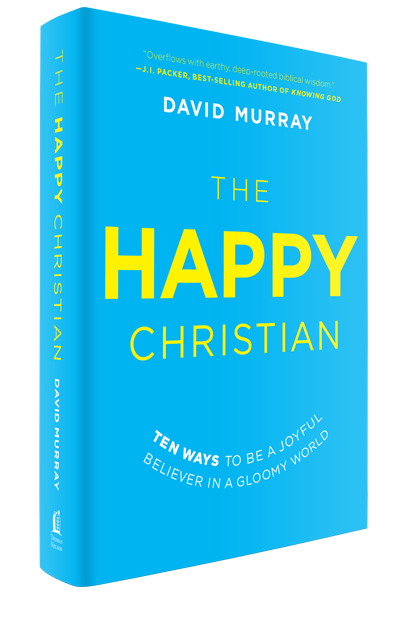 BOOK REVIEW: The Happy Christian, David P. Murray, Thomas Nelson, pbk, 262 pp., £11.
BOOK REVIEW: The Happy Christian, David P. Murray, Thomas Nelson, pbk, 262 pp., £11.
The electric blue cover with lurid yellow lettering might proclaim another self-help book, but for those familiar with his previous books and daily blog, the author’s name is a sure guarantor of quality, and of Reformed spirituality.
Since relocating to America David Murray has developed a marvellously clear and attractive writing style, full of windows of illustration, frequently snippets of autobiography, which are always the most interesting kind. This makes his work very accessible, even to those without any habit of reading.
The subject of this work could scarcely be more important. Christians everywhere are anxious, despondent, even embittered. Happiness, rare enough anyway in this gloomy world, is sadly none too frequent even where it should be – amongst the chosen people of God.
This would be comfortable subject matter for a Puritan writer, as they tended to excel at combining theology with practical application, but is a sad by-product of modern academia that theological discussion tends to be entirely divorced from Christian practice. It is very healthy to see Dr Murray restore this combination, in this fresh and attractive volume. His principal source is always the exegesis of Scripture itself, and it is regrettable that the use of unfamiliar NKJV quotations, and the relegation of the actual verse references to the endnotes, tends to obscure this.
Murray proposes ten areas in which believers may, and indeed should, experience happiness. Like Martyn Lloyd-Jones in Spiritual Depression, he stresses the need for Christians to self-counsel, using the example of Asaph in Psalm 77. He also urges believers to guard carefully what media we consume to avoid unnecessarily depressing ourselves – a thoroughly modern application of Philippians 4:8.
He majors on the vital truth of redemption accomplished, that ‘it is finished’, and that our salvation is ‘not of works.’ These precious truths of theology, properly applied, must beget both wholeness and emotional and spiritual growth. His emphasis that Christianity must not leave people broken is important in our tradition of Highland Evangelicalism, which could at times tend almost to make a virtue of being the bruised reed and the smoking flax!
Murray impresses with his ability to draw useful lessons from secular research, while fitting these into an orthodox theological framework. For example, he stresses happiness as the product of social networks – for Christians, the church – and as the product of giving, especially the giving of praise. This is the most urgent and vital lesson that I personally took, the need to be encouraging rather than judgmental, both for my own happiness and that of others. Murray points out the toxic effect of continual judgmentalism for our own happiness.
He stresses work, not just specifically Christian work, but all legitimate employment, as to God’s glory and productive of happiness. This lesson needs to be more widely taught and understood to foster contentment and satisfaction in those not called to full-time Christian employment. The example of Jesus, laboring diligently for years in manual work in Galilee before His teaching ministry commenced, and the instruction of Paul in Col 3:23 (‘And whatsoever ye do, do it heartily, as to the Lord, and not unto men’) must be emphasized to those called to a life of ‘secular’ work.
A final chapter on diversity producing happiness is more relevant in the American context of ‘white’ churches and ‘black’ churches. One absence I felt from the book was a stress on Christian obedience as itself directly producing happiness. Christian happiness is promoted by disciplined personal devotions, faithful conduct of family worship, and regular attendance at the means of grace. This point is not clearly stated, and is needed in the context of American New Calvinism to which this book will minister.
Dr Murray concludes the book discussing faith as inherently optimistic, and the need for believers to have a clear, realistic, yet truthfully optimistic outlook to be resilient in happiness. Overall, I think there are few Christians today who do not need to think more about happiness. Consequently, this is a book worthy of a wide and thoughtful readership.


Leave a Reply